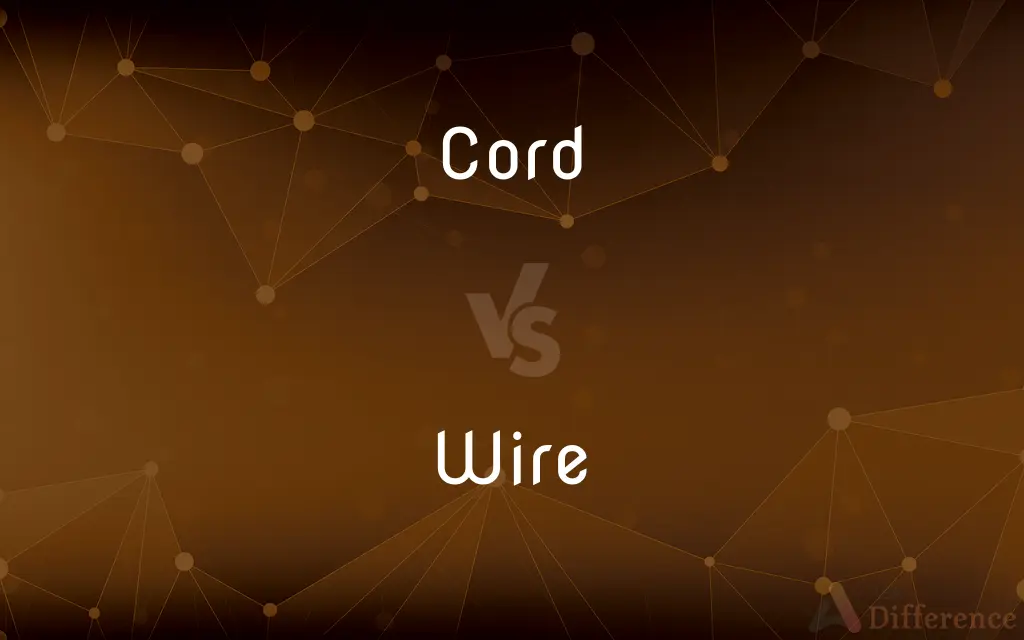Cord vs. Wire — What's the Difference?
By Tayyaba Rehman & Urooj Arif — Updated on April 25, 2024
"Cord" typically refers to a flexible, insulated cable used for carrying electricity or data, while "wire" is a single conductor material, often metal, used in various applications.

Difference Between Cord and Wire
Table of Contents
ADVERTISEMENT
Key Differences
A "cord" is often insulated and contains multiple wires bundled together to transmit power or data, whereas a "wire" is usually a single strand or conductor, made primarily of metals like copper or aluminum.
Cords are designed for safety and durability, often sheathed in materials like rubber or plastic to prevent electrical hazards, while wires may or may not have insulation depending on their intended use.
In electrical applications, cords are used to connect appliances to power sources, providing flexibility and ease of movement, whereas wires are used within circuits, appliances, and for transmitting signals and electricity across distances.
The choice between using a cord and a wire depends on the application; cords are preferred for temporary or movable connections, while wires are chosen for permanent, fixed wiring in buildings and electronics.
While both cords and wires are fundamental to electrical and telecommunications systems, cords offer a plug-and-play convenience, and wires provide the structural backbone.
ADVERTISEMENT
Comparison Chart
Definition
An insulated cable of one or more wires
A single electrical conductor
Composition
Multiple wires wrapped in an outer sheath
Typically a single strand or metal conductor
Insulation
Always insulated for protection
May or may not be insulated
Usage
Used for flexible, temporary connections
Used for permanent, structural connections
Safety Features
Designed to prevent electrical hazards
Varies depending on the type of wire and use
Compare with Definitions
Cord
A flexible string of insulated wires used to transmit electricity.
She plugged the lamp into the wall using a power cord.
Wire
A single conductor used in electrical and communication fields.
The electrician used copper wire for the installation.
Cord
Often comes with connectors at both ends for easy usage.
The extension cord extends the reach of any electrical outlet.
Wire
Available in various gauges to handle different loads.
Thicker gauge wire is used for higher power applications.
Cord
A durable connection used for various electrical devices.
The vacuum cleaner has a long cord for easy mobility.
Wire
Essential for creating circuits and electrical connections.
He twisted the wires together to complete the circuit.
Cord
Commonly found in household appliances and electronic devices.
Ensure the cord is not frayed before use.
Wire
Forms the conducting paths in most electronic devices.
The circuit board is etched with fine wires for signal paths.
Cord
Can be specialized for data or power transmission.
The USB cord connects the phone to the computer for data transfer.
Wire
Can be bare or insulated depending on its application.
Bare copper wire is often used for grounding electrical systems.
Cord
A slender length of flexible material usually made of twisted strands or fibers and used to bind, tie, connect, or support. See Usage Note at chord1.
Wire
A wire is a single usually cylindrical, flexible strand or rod of metal. Wires are used to bear mechanical loads or electricity and telecommunications signals.
Cord
An insulated flexible electric wire fitted with a plug or plugs.
Wire
Metal that has been drawn out into a strand or rod, used chiefly for structural support, as in concrete, and for conducting electricity, when it is usually insulated with a rubber or plastic cladding
Bought some wire at the hardware store.
Cord
A hangman's rope.
Wire
A strand or rod of such material, or a cable made of such strands twisted together.
Cord
An influence, feeling, or force that binds or restrains; a bond or tie.
Wire
Fencing made of wire, especially barbed wire.
Cord
Also chord(Anatomy)A long ropelike structure, such as a nerve or tendon
A spinal cord.
Wire
Wires The system of strings employed in manipulating puppets in a show.
Cord
A raised rib on the surface of cloth.
Wire
(Slang) A hidden microphone, as on a person's body or in a building.
Cord
A fabric or cloth with such ribs.
Wire
A telephone or telegraph connection
Who is on the wire?.
Cord
Cords Pants made of corduroy.
Wire
A telegraph service
Sent the message by wire.
Cord
A unit of quantity for cut fuel wood, equal to a stack measuring 4 × 4 × 8 feet or 128 cubic feet (3.62 cubic meters).
Wire
A wire service
The news came over the wire.
Cord
To fasten or bind with a cord
Corded the stack of old newspapers and placed them in the recycling bin.
Wire
A pin in the print head of a computer printer.
Cord
To furnish with a cord.
Wire
The screen on which sheets of paper are formed in a papermaking machine.
Cord
To pile (wood) in cords.
Wire
(Sports) The finish line of a racetrack.
Cord
A long, thin, flexible length of twisted yarns (strands) of fiber (rope, for example); uncountable such a length of twisted strands considered as a commodity.
The burglar tied up the victim with a cord.
He looped some cord around his fingers.
Wire
(Slang) A pickpocket.
Cord
A small flexible electrical conductor composed of wires insulated separately or in bundles and assembled together usually with an outer cover; the electrical cord of a lamp, sweeper (US vacuum cleaner), or other appliance.
Wire
To equip with a system of electrical wires
Wire a house.
Cord
A unit of measurement for firewood, equal to 128 cubic feet (4 × 4 × 8 feet), composed of logs and/or split logs four feet long and none over eight inches diameter. It is usually seen as a stack four feet high by eight feet long.
Wire
To attach or connect with electrical wire or cable
Is the printer wired to the computer?.
Cord
(figuratively) Any influence by which persons are caught, held, or drawn, as if by a cord.
Wire
To attach or fasten with wire
Surgeons wired his shoulder together.
Cord
(anatomy) Any structure having the appearance of a cord, especially a tendon or nerve.
Spermatic cord; spinal cord; umbilical cord; vocal cords
Wire
(Slang) To install electronic eavesdropping equipment in (a room, for example).
Cord
Dated form of chord: musical sense.
Wire
To send by telegraph
Wired her congratulations.
Cord
Misspelling of chord: a cross-section measurement of an aircraft wing.
Wire
To send a telegram to (someone).
Cord
To furnish with cords
Wire
(Computers) To implement (a capability) through logic circuitry that is permanently connected within a computer or calculator and therefore not subject to change by programming.
Cord
To tie or fasten with cords
Wire
To determine genetically; hardwire
"It is plausible that the basic organization of grammar is wired into the child's brain" (Steven Pinker).
Cord
To flatten a book during binding
Wire
To send a telegram.
Cord
To arrange (wood, etc.) in a pile for measurement by the cord.
Wire
(uncountable) Metal formed into a thin, even thread, now usually by being drawn through a hole in a steel die.
Cord
A string, or small rope, composed of several strands twisted together.
Wire
A piece of such material; a thread or slender rod of metal, a cable.
Cord
A solid measure, equivalent to 128 cubic feet; a pile of wood, or other coarse material, eight feet long, four feet high, and four feet broad; - originally measured with a cord or line.
Wire
A metal conductor that carries electricity.
Cord
Fig.: Any moral influence by which persons are caught, held, or drawn, as if by a cord; an enticement; as, the cords of the wicked; the cords of sin; the cords of vanity.
The knots that tangle human creeds,The wounding cords that bind and strainThe heart until it bleeds.
Wire
A fence made of usually barbed wire.
Cord
Any structure having the appearance of a cord, esp. a tendon or a nerve. See under Spermatic, Spinal, Umbilical, Vocal.
Wire
(sports) A finish line of a racetrack.
Cord
See Chord.
Wire
(informal) A telecommunication wire or cable.
Cord
To bind with a cord; to fasten with cords; to connect with cords; to ornament or finish with a cord or cords, as a garment.
Wire
(by extension) An electric telegraph; a telegram.
Cord
To arrange (wood, etc.) in a pile for measurement by the cord.
Wire
(slang) A hidden listening device on the person of an undercover operative for the purposes of obtaining incriminating spoken evidence.
Cord
A line made of twisted fibers or threads;
The bundle was tied with a cord
Wire
(billiards) A wire strung with beads and hung horizontally above or near the table which is used to keep score.
Cord
A unit of amount of wood cut for burning; 128 cubic feet
Wire
Any of the system of wires used to operate the puppets in a puppet show; hence, the network of hidden influences controlling the action of a person or organization; strings.
To pull the wires for office
Cord
A light insulated conductor for household use
Wire
A pickpocket, especially one who targets women.
Cord
A cut pile fabric with vertical ribs; usually made of cotton
Wire
(slang) A covert signal sent between people cheating in a card game.
Cord
Stack in cords;
Cord firewood
Wire
(Scotland) A knitting needle.
Cord
Bind or tie with a cord
Wire
The slender shaft of the plumage of certain birds.
Wire
To fasten with wire, especially with reference to wine bottles, corks, or fencing.
We need to wire that hole in the fence.
Wire
To string on a wire.
Wire beads
Wire
To equip with wires for use with electricity.
Do you know how to wire a plug?
Wire
To connect, embed, incorporate, or include (something) into (something else) by or as if by wires:
Wire
To add (something) into a system (especially an electrical system) by means of wiring.
I'll just wire your camera to the computer screen.
Wire
To add or connect (something) into a system as if with wires (for example, with nerves).
Wire
To connect, involve or embed (something) deeply or intimately into (something else, such as an organization or political scene), so that it is keeping up with current information about (the thing) or has insinuated itself into (the thing).
Wire
To set or predetermine (someone's personality or behaviour, or an organization's culture) in a particular way.
There's no use trying to get Sarah to be less excitable. That's just the way she's wired.
Wire
To send a message or monetary funds to another person through a telecommunications system, formerly predominantly by telegraph.
Urgent: please wire me another 100 pounds sterling.
The detective wired ahead, hoping that the fugitive would be caught at the railway station.
Wire
(slang) To make someone tense or psyched up. See also adjective wired.
Coffee late at night wires me good and proper.
Wire
(slang) To install eavesdropping equipment.
We wired the suspect's house.
Wire
To snare by means of a wire or wires.
Wire
To place (a ball) so that the wire of a wicket prevents a successful shot.
Wire
A thread or slender rod of metal; a metallic substance formed to an even thread by being passed between grooved rollers, or drawn through holes in a plate of steel.
Wire
A telegraph wire or cable; hence, an electric telegraph; as, to send a message by wire.
Wire
The system of wires used to operate the puppets in a puppet show;
Wire
One who picks women's pockets.
Wire
A knitting needle.
Wire
A wire stretching across over a race track at the judges' stand, to mark the line at which the races end.
Wire
To bind with wire; to attach with wires; to apply wire to; as, to wire corks in bottling liquors.
Wire
To put upon a wire; as, to wire beads.
Wire
To snare by means of a wire or wires.
Wire
To send (a message) by telegraph.
Wire
To place (a ball) so that the wire of a wicket prevents a successful shot.
Wire
To equip with a system of wiring, especially for supply of electrical power or communication; as, to wire an office for networking the computers; to wire a building with 220-Volt current.
Wire
To equip with an electronic system for eavesdropping; to bug; as, to wire the office of a mob boss; to wire an informant so as to record his conversations.
Wire
To pass like a wire; to flow in a wirelike form, or in a tenuous stream.
Wire
To send a telegraphic message.
Wire
Ligament made of metal and used to fasten things or make cages or fences etc
Wire
A metal conductor that carries electricity over a distance
Wire
The finishing line on a racetrack
Wire
A message transmitted by telegraph
Wire
Provide with electrical circuits;
Wire the addition to the house
Wire
Send cables, wires, or telegrams
Wire
Fasten with wire;
The columns were wired to the beams for support
Wire
String on a wire;
Wire beads
Wire
Equip for use with electricity;
Electrify an appliance
Common Curiosities
How does the thickness of a wire affect its use?
The thickness, or gauge, of a wire affects its current-carrying capacity and resistance; thicker wires can carry more current and have lower resistance.
What is the purpose of the grounding wire in a cord?
The grounding wire in a cord provides a safe path for electrical current in case of a fault, helping to prevent electric shock.
Can cords be used outdoors?
Some cords are specifically designed for outdoor use and have weather-resistant insulation to protect against moisture, temperature, and UV light.
What is the difference between stranded and solid wire?
Stranded wire is made of multiple small strands twisted together, offering flexibility, whereas solid wire consists of a single piece of metal, providing stability and ease of installation in certain contexts.
What types of materials are commonly used for wires?
Wires are commonly made from copper, aluminum, and sometimes silver, depending on the conductivity and flexibility required.
Are there different standards for cords and wires in different countries?
Yes, cords and wires must meet specific national standards regarding safety, performance, and compatibility, which can vary by country.
How do you properly store wires and cords to ensure longevity?
Wires and cords should be coiled loosely to avoid kinks and stored in a dry, cool place away from direct sunlight to prevent degradation.
Why are most cords black or white?
Black and white are standard colors for cords, with black being resistant to dirt and aging, while white can blend easily with interior decor.
How does the voltage rating of a cord or wire affect its application?
The voltage rating determines the maximum voltage the cord or wire can safely handle, which must match or exceed the voltage of the electrical system used.
Can the length of a cord affect its performance?
Yes, longer cords can experience voltage drop and power loss, especially if the wire gauge is not suitable for the current or distance.
What is the best way to repair a damaged cord or wire?
For safety and reliability, it's recommended to replace a damaged cord or wire, but if repair is necessary, use proper techniques and materials approved for electrical repairs, or consult a professional.
What is the significance of the color coding of wires inside a cord?
Color coding in wires follows electrical standards to indicate their function within the cord, such as live, neutral, and ground, enhancing safety and simplifying repairs.
What safety certifications should be looked for when purchasing wires and cords?
Look for certifications from recognized standards organizations, such as UL (Underwriters Laboratories) or CE (Conformité Européenne), which ensure that the product meets safety guidelines.
What are shielded wires, and when are they used?
Shielded wires have a conductive layer around the conductor to prevent electromagnetic interference, crucial in environments with high electronic noise.
How can one identify a high-quality wire or cord?
High-quality wires and cords typically have durable insulation, are compliant with safety standards, and are made by reputable manufacturers.
Share Your Discovery

Previous Comparison
Friends vs. Mates
Next Comparison
Quitting vs. QuittedAuthor Spotlight
Written by
Tayyaba RehmanTayyaba Rehman is a distinguished writer, currently serving as a primary contributor to askdifference.com. As a researcher in semantics and etymology, Tayyaba's passion for the complexity of languages and their distinctions has found a perfect home on the platform. Tayyaba delves into the intricacies of language, distinguishing between commonly confused words and phrases, thereby providing clarity for readers worldwide.
Co-written by
Urooj ArifUrooj is a skilled content writer at Ask Difference, known for her exceptional ability to simplify complex topics into engaging and informative content. With a passion for research and a flair for clear, concise writing, she consistently delivers articles that resonate with our diverse audience.














































